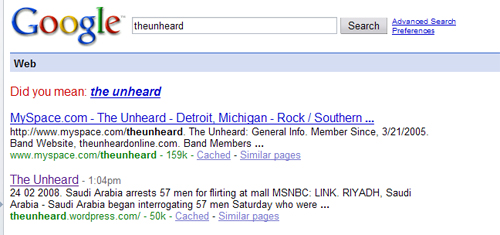
Judge Shuts Down Web Site Specializing in Leaks
New York Times: LINK
This is bogus. shouldn’t they be going after the people doing this crazy shit, not the people posting it?
In a move that legal experts said could present a major test of First Amendment rights in the Internet era, a federal judge in San Francisco on Friday ordered the disabling of a Web site devoted to disclosing confidential information.
The site, Wikileaks.org, invites people to post leaked materials with the goal of discouraging “unethical behavior” by corporations and governments. It has posted documents said to show the rules of engagement for American troops in Iraq, a military manual for the operation of the detention center at Guantánamo Bay, Cuba, and other evidence of what it has called corporate waste and wrongdoing.
The case in San Francisco was brought by a Cayman Islands bank, Julius Baer Bank and Trust. In court papers, the bank said that “a disgruntled ex-employee who has engaged in a harassment and terror campaign” provided stolen documents to Wikileaks in violation of a confidentiality agreement and banking laws. According to Wikileaks, “the documents allegedly reveal secret Julius Baer trust structures used for asset hiding, money laundering and tax evasion.”
On Friday, Judge Jeffrey S. White of Federal District Court in San Francisco granted a permanent injunction ordering Dynadot, the site’s domain name registrar, to disable the Wikileaks.org domain name. The order had the effect of locking the front door to the site — a largely ineffectual action that kept back doors to the site, and several copies of it, available to sophisticated Web users who knew where to look.
Domain registrars like Dynadot, Register.com and GoDaddy .com provide domain names — the Web addresses users type into browsers — to Web site operators for a monthly fee. Judge White ordered Dynadot to disable the Wikileaks.org address and “lock” it to prevent the organization from transferring the name to another registrar.
The feebleness of the action suggests that the bank, and the judge, did not understand how the domain system works, or how quickly Web communities will move to counter actions they see as hostile to free speech online.
The site itself could still be accessed at its Internet Protocol address (http://88.80.13.160/) — the unique number that specifies a Web site’s location on the Internet. Wikileaks also maintained “mirror sites,” or copies usually produced to ensure against failures and this kind of legal action. Some sites were registered in Belgium (http://wikileaks.be/), Germany (http://wikileaks.de) and the Christmas Islands (http://wikileaks.cx) through domain registrars other than Dynadot, and so were not affected by the injunction.
Fans of the site and its mission rushed to publicize those alternate addresses this week. They have also distributed copies of the bank information on their own sites and via peer-to-peer file sharing networks.
In a separate order, also issued on Friday, Judge White ordered Wikileaks to stop distributing the bank documents. The second order, which the judge called an amended temporary restraining order, did not refer to the permanent injunction but may have been an effort to narrow it.
Lawyers for the bank and Dynadot did not respond to requests for comment. Judge White has scheduled a hearing in the case for Feb. 29.
In a statement on its site, Wikileaks compared Judge White’s orders to ones eventually overturned by the United States Supreme Court in the Pentagon Papers case in 1971. In that case, the federal government sought to enjoin publication by The New York Times and The Washington Post of a secret history of the Vietnam War.
“The Wikileaks injunction is the equivalent of forcing The Times’s printers to print blank pages and its power company to turn off press power,” the site said, referring to the order that sought to disable the entire site.
The site said it was founded by dissidents in China and journalists, mathematicians and computer specialists in the United States, Taiwan, Europe, Australia and South Africa. Its goal, it said, is to develop “an uncensorable Wikipedia for untraceable mass document leaking and analysis.”
Judge White’s order disabling the entire site “is clearly not constitutional,” said David Ardia, the director of the Citizen Media Law Project at Harvard Law School. “There is no justification under the First Amendment for shutting down an entire Web site.”
The narrower order, forbidding the dissemination of the disputed documents, is a more classic prior restraint on publication. Such orders are disfavored under the First Amendment and almost never survive appellate scrutiny.




 Get Satisfaction allows people to post feedback about their experiences with any company they choose, and it encourages companies to visit its site,
Get Satisfaction allows people to post feedback about their experiences with any company they choose, and it encourages companies to visit its site, 